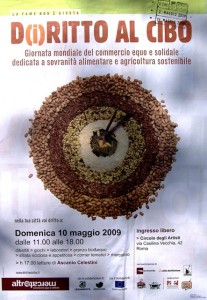Today, May 9th is World Fair Trade Day, apparently. I had no idea until I saw this poster a few days ago. And even then there was some confusion as for some reason the date on it is the 10th.

The theme is food sovereignty and sustainable agriculture. There’s a great-looking programme being organized here in Rome. Anyway, as an old germplasm collector, I can really relate to all those seeds on the poster.